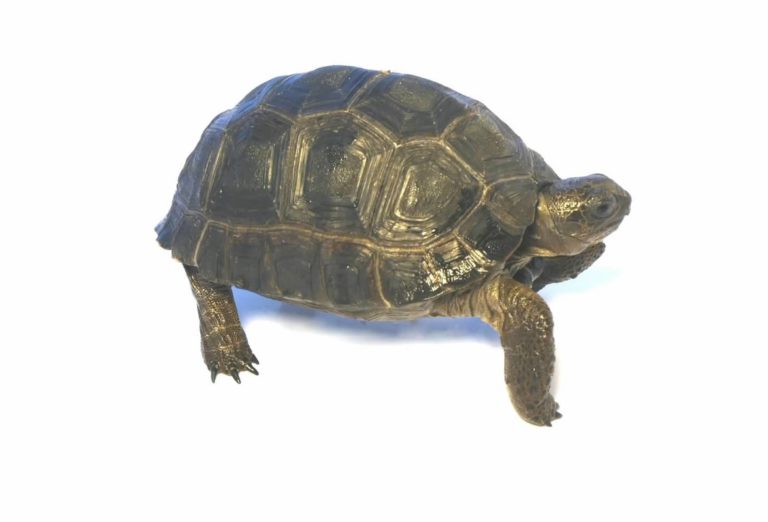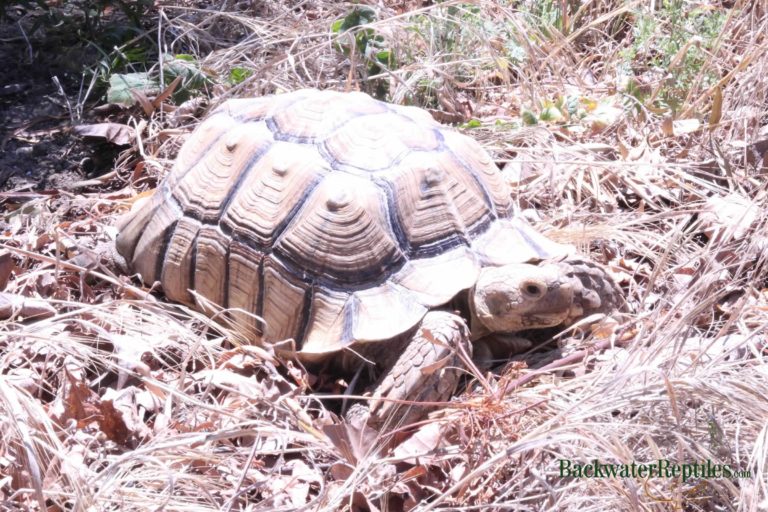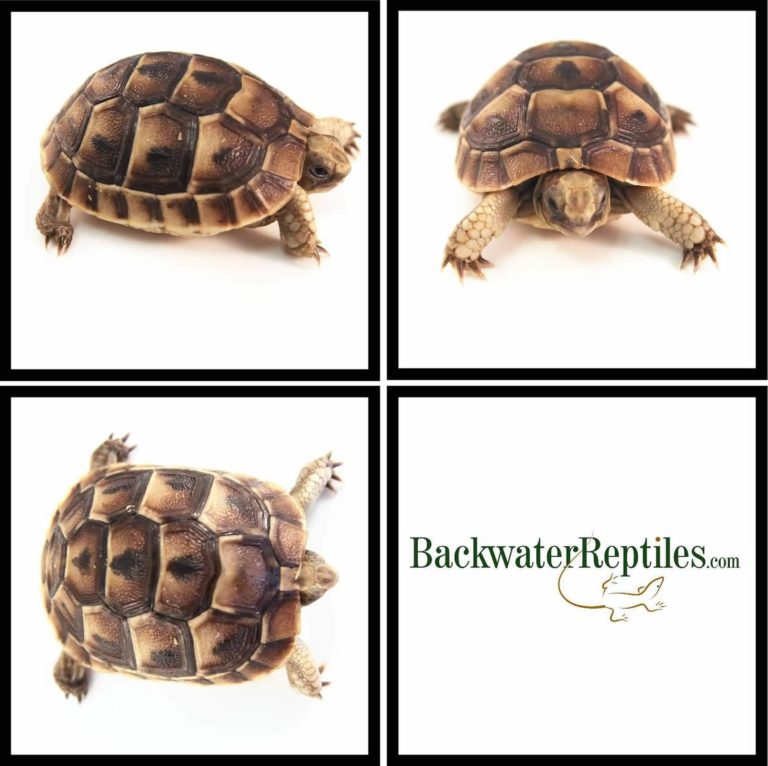What are the largest species of tortoise commonly kept as pets?
The largest species of pet tortoises are Aldabra Tortoises and Sulcata Tortoises. Most other tortoise species kept as pets remain fairly small and are relatively comparable in size including: Star Tortoises, Leopard Tortoises, Greek Tortoises, and Russian Tortoises.
For the purposes of this article, we’ll stick to discussing the main two larger species, the Aldabra and Sulcata Tortoises.
Aldabra Tortoise (Geochelone gigantea)
As its name suggests, the Aldabra Tortoise is found in a very specific area of the world – on the islands of the Aldabra Atoll in the Seychelles. They are typically dark grey, brown or tan with a tall, domed shell. They also have relatively long necks for a tortoise which helps them when grazing on trees in the wild.
As indicated, Aldabras are one of the largest species of tortoise that are kept as pets. They are second in size only to the giant Galapagos Tortoise, which cannot be kept as a pet, making them the largest species of tortoise you can legally own. The carapace of the Aldabra Tortoise averages about 48 inches long, while the average weight reported varies between 290 to 550 pounds. It’s likely that these number values are so far apart because males and females are considerably different in size and also because there are not too many “sample” animals that have lived long enough in captivity to obtain extremely accurate records.

Although Aldabra Tortoises make excellent pets with very long life spans, they are somewhat hard to come by, particularly adult specimens. It’s far more likely that you’ll find a breeder offering babies or juveniles for sale as adults take a considerable amount of time to reach their full mature size. Aldabras are actually thought to be one of the longest-lived animals with some being recorded as reaching over 200 years old. This means that if you intend to own an Aldabra, you will own it for life and then you’ll likely have to make arrangements for the tortoise once you pass on!
Because Aldabra Tortoises are not particularly easy to come by, even within the reptile hobbyist world, they tend to come with quite a hefty price tag. However, if you purchase from a reputable breeder or importer, we doubt you’ll regret it since these reptiles have a lot of personality and make highly rewarding pets.
Due to their large size, Aldabra Tortoises require special enclosures…at least once they’re fully grown. We are of the mentality that natural is best, so we always recommend that any larger, hardier species of tortoise be kept outdoors if possible.
They do very well in tortoise pens outside as long as the weather is not extreme. A good outdoor enclosure for an Aldabra should have walls that are a little over two feet tall and there should be plenty of room inside for the tortoise to roam.
You should also include a tortoise hide space that is sheltered from poor weather and heated in case temperatures drop too low.
But what about young Aldabra Tortoises? Although they can be kept outside, we recommend keeping Aldabras younger than two years old indoors. They are more sensitive to their environment and are vulnerable to predators.
They will need the standard tortoise enclosure items of a hide, water dish, proper substrate, UV lights and a heat source. Once they are large enough and/or old enough, you can relocate them to an outdoor pen.
In captivity and in the wild, Aldabra tortoises are primarily herbivores. However, they have been observed eating protein/meat in the wild when the opportunity presents itself. In captivity, you can feed your Aldabra Tortoise typical tortoise fare including tortoise pellets and veggies such as cactus pads, leafy greens and fruits for treats.
Backwater Reptiles does receive Aldabra Tortoises from time to time, however we do not have them listed for sale on our website as they are not in extremely high demand.
If you’re interested in obtaining a pet Aldabra Tortoise of your own, you can email our customer service team at sales@backwaterreptiles.com for a price quote and availability.
If you wish to learn more about Aldrabra Tortoise care, you can also check out our blog article on this lovely species.
Sulcata Tortoise (Geochelone sulcata)
The Sulcata Tortoise is known by a few other names including African Spurred Tortoise, Spurred Tortoise, and African Spur Thigh Tortoise. Whatever name you might know this species by, one thing is for sure – they are the most commonly bred tortoise species in the world. Sulcata Tortoises are readily captive bred these days in the U.S. This means that babies are typically available year round, which is very different than the Aldabra Tortoise.
Although they are the second largest tortoise species that you can legally keep as a pet, Sulcatas are actually typically quite small when they find their homes. Backwater Reptiles usually sells them as babies. Like Aldabra Tortoises, they also have incredibly long lives. They are estimated to be able to live well beyond seventy years old!

Many people are drawn to Sulcatas because they are very easy pets to keep and are relatively low maintenance. However, they also have wide appeal due to their appearance and likeable personalities. Sulcatas are typically light straw-colored or brown with round shells rather than domed ones. They can reach around 200 pounds and approximately 36 inches in length.
Although Sulcatas are burrowers, they still do best housed outdoors in a pen. You will need to make sure your enclosure has walls high enough that your tortoises can’t climb over them. In addition, it’s necessary to extend your walls below ground so that your Sulcatas can’t dig their way out of your yard.
Sulcatas in outdoor enclosures should be at least a few years old. Like any outdoor reptile, they will need an sheltered area to avoid extreme weather such as rain or extreme hot or cold. Ideally, your shelter should also be temperature controlled.
Your Sulcata tortoise will be easy to feed as they usually have hearty appetites. They will enjoy eating vegetation that grows within the perimeter of their outdoor pen, but they will also munch on many of the same foods that an Aldabra Tortoise would.
They enjoy commercial tortoise pellets, green leafy veggies, fruit, and juicy vegetables as well. Variety is key when it comes to making sure that your Sulcata is getting a balanced diet.
One of the fun things about owning a Sulcata is that they often behave like dogs. They are friendly and will come running to greet their owner, especially if the owner is bringing them food! While they might be too slow to take on a walk, they are definitely docile and will happily show off their unique personalities.
Backwater Reptiles typically sells baby Sulcata Tortoises year round. We don’t often come by the larger, adult tortoises, however sometimes we do re-home rescues.
If you are interested in learning more about Sulcata Tortoise care, you can also check out our previous blog article on caring for these fun reptiles. We also wrote an article on how to create an outdoor Sulcata Tortoise enclosure.
Conclusion
In our opinion, all tortoises make adorable and entertaining pets. Their vegetarian nature makes them docile creatures that typically enjoy human interaction. They are also highly intelligent, can learn to recognize their owners are and some even behave like dogs!

We’re also big fans of tortoises because it’s pretty uncomplicated to make outdoor pens or enclosures for them. Any reptile will be happiest when their natural habitat is closely replicated and with tortoises, it’s easy to do this.
The larger species do take a very long time to grow to be their full size, but half the fun is watching them grow and nurturing them along during the journey.
Ultimately, we do encourage all potential pet owners to research prior to making the commitment to any animal. Tortoises, particularly the large Aldabra and Sulcata species, have very long life spans and specific care requirements.
We recommend making sure you can care for the animal as a baby through to adulthood since their housing requirements will change as they grow.
